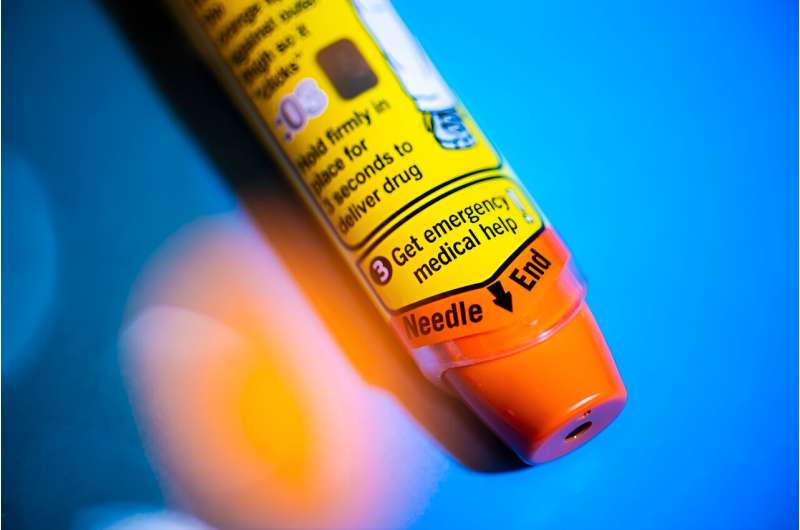This article has been reviewed according to Science X's editorial process and policies. Editors have highlighted the following attributes while ensuring the content's credibility:
fact-checked
trusted source
proofread
New neffy nasal spray alternative to the EpiPen could be 'a gamechanger' for people with allergies

Millions of Americans who have allergies have really had only one option when it comes to emergency treatment for a severe reaction: using an autoinjector like the EpiPen.
But now there's an alternative. The U.S. Food and Drug Administration recently approved a new nasal spray that releases epinephrine, the medication used to stop reactions, into the nose instead of having it injected via needle.
The spray, sold under the brand name neffy, will address some of the main concerns people have with the EpiPen, which include the cost, the delivery method, and the size, Northeastern experts say.
"There's a significant percentage of the population that has some form of allergy," says Neil Maniar, director of the master of public health program and professor of the practice at Northeastern University. "Up until now, in terms of delivering a quick shot of epinephrine, the EpiPen was the only option.
"Over the last several years, the cost of the EpiPen spiked. It's also an injection. … Some people have very strong feelings and fears around that. … (The nasal spray) is a game changer. It's a really important step from a public health perspective to have that alternative that hopefully can be more readily available and used with greater ease."
The cost of EpiPens skyrocketed around 2016 when Mylan acquired the product, says Gary Young, professor of public health and director of the Northeastern University Center for Health Policy and Healthcare Research. EpiPens used to cost about $100 per two-injector pack; they now cost about $600. Mylan authorized a generic product for half the cost, but the price still made the device inaccessible to many.
"There didn't seem to be any justification other than the fact Mylan had acquired the product and felt that they could price it at that level and generate the margins that they wanted to generate," Young says. "It seemed rather callous and they took a lot of criticism for it."
Neffy is expected to cost $199 for two doses for people without insurance. Patients with commercial insurance can get two doses for $25. This pricing means Mylan has a reason to become more competitive with their products, Young says.
"It's probably going to have a very big impact, because I think people are going to prefer the spray to the needle," he adds. "I think it will also have a big impact on the pricing for the EpiPen. … Over time, this is going to represent a very important competitive threat to the pen and I expect to see the pricing going down."
Even those with an epinephrine injectable don't always use it in an emergency. ARS Pharma, the creator of neffy, says they found more than half of those with an injection pen did not use it in an emergency.
Mansoor Amiji, a university distinguished professor of pharmaceutical sciences and chemical engineering at Northeastern, says the nasal spray has been found to be as effective as the injectable but doesn't involve a needle. This not only can assuage the fears people might have around needles, but it's also easier to use and lowers the risk of infection.
In the case of an anaphylactic reaction, a person needs the epinephrine right away, so there may not always be time to clean the insertion site, posing a risk of contamination, Amiji explains.
"The risk is relatively minor compared to the benefit," he says. "(But) individuals, especially children, who do not like needles feel this is an alternative. It's a much safer way of administrating and much more patient compliant."
Amiji adds the new nasal spray is also much smaller than the injectables, which are about 6 inches long.
"One of my friends used to call (the EpiPen) a baton," he says. "The fact that (the spray) is small enough to be put in a purse or a pocket (makes it) a lot easier to carry."
Maniar says because of these concerns, many people with allergies don't carry an EpiPen or generic injectable. According to ARS Pharma, the manufacturer of the nasal spray, only 3.2 million of the 40 million people in the United States at risk for severe allergic reactions had a prescription for an epinephrine injection pen. Another recent study showed only about half of adults with food allergies had access to epinephrine.
Having a new option might address some of these people's concerns and could increase the rate of people carrying EpiPens and subsequently, the number of hospitalizations and deaths from allergic reactions, Maniar says.
"A big part of this is going to be around health communication and really informing individuals and informing families that this is available, that it is safe, it is effective," he adds. "Giving people the information that they need to make the right decisions about their health, I think it will (have an impact)."
This story is republished courtesy of Northeastern Global News news.northeastern.edu.





















